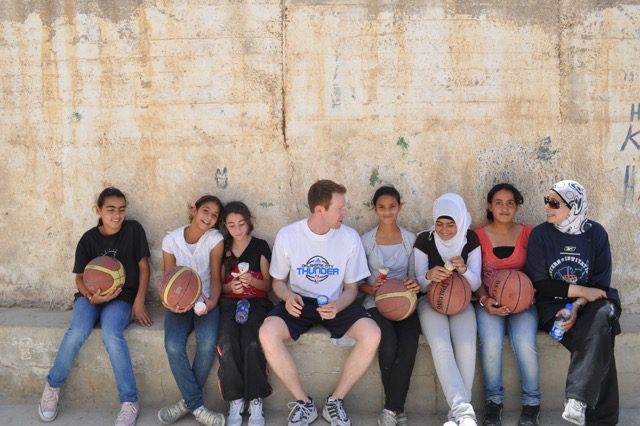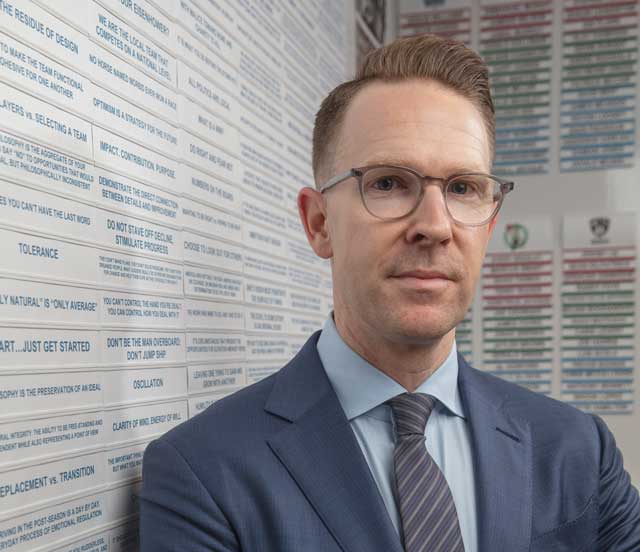WEB EXCLUSIVE: Sam Presti, one of our Oklahomans of the Year, has many stories to tell outside the world of professional sports. The general manager of the Oklahoma City Thunder opened up extensively with Oklahoma Magazine about community, athletics and culture. Following is a question-and-answer web exclusive.
OM: Please discuss your social justice and humanitarian commitments. Mandy Winton and Moises Echeveria at the Oklahoma Center for Community and Justice cannot stop trumpeting your praises.
SP: Personally, I don’t view them as commitments; I view them as values, beliefs or, at minimum, instincts.
OM: Where do you get this social consciousness? Is it lifelong? Or have you evolved to have these views through experience? If so, how did this happen? When? Why?
SP: My grandfather was very focused on philanthropy and community; helping your fellow man was a common refrain I heard a lot. My grandmother on my father’s side belonged to every board, committee and cause there was. One of my favorite photos is of her picketing the closure of a public library near her home … at 85 years old. She had grit; my grandfather had grace and judgment. I’m deeply affected by people, nostalgia, purpose and mission.
OM: I know that you and San Antonio Spurs coach Greg Popovich are close and that Coach Pop has been a mentor to you. Have Coach Pop’s social justice views rubbed off on your or did you two come together as friends because of your similar outlooks?
SP: Pop is his own person, but I think that being around him made me appreciate that you can work in an industry like professional sports and not get lost in what is sometimes the silliness of it all. So much of this industry is out of your control and totally misunderstood; you can’t take yourself too seriously, nor can you be too unkind to yourself either. I’ve come to appreciate the creative and social aspects to the role aside from the leadership and management fundamentals that govern the work. The job is not ours; it is the organization’s. We are simply serving the role and attempting to build the standards in such a way that contribution can outlast tenure.

OM: Please discuss your support and advocacy for OCCJ. Why that group? Why is it important to you? How does it relate to your being named OCCJ’s Humanitarian of the Year in 2016?
SP: I was honored. I guess a better way to say it was I was stunned when I got the letter that they wanted to recognize me. The more I learned about their mission, the more I was impressed. A lot of people talk about affecting change and surfacing issues, but the OCCJ is doing it. There is so much work to be done in this space, and Oklahoma City has the chance to stimulate real tangible progress, and provide leadership for the state. It’s not a choice; it’s now a calling, a responsibility at this point. As [Thunder star guard] Russell Westbrook said, ‘We can all be better,’ and that is so true. Oklahoma City is in the driver’s seat and we need two hands on the wheel and a heavy foot on this issue. Failing to improve the awareness and value of diversity, inclusion and acceptance is really failing our future generations and neglecting them from what should be the benefits from a period of growth, innovation and civic pride in a city that sees itself as on the rise. Until our community can point to progress and change in these critical areas, the renaissance of Oklahoma City will remain incomplete. Oklahoma City has been a catalyst for so much in the state, but the leadership bell is ringing once more and I believe our community leadership will answer that call.
OM: It’s obvious that community involvement is important to you. Why? Besides having each new Thunder player visit the Oklahoma City National Memorial and Museum, what else do you encourage that new player to do?
SP: I wouldn’t limit it to new players; it’s our hope that anyone who plays or works for the Thunder feels as if they are helping to build a legacy in real time. We want our players to understand that what they represent in Oklahoma City is bigger than basketball, and that they have helped stimulate a community and a region through their professionalism and citizenship. We play basketball games, but we exist to be the people’s team, to create memories for families and individuals, and to be a team that is deliberate and intentional about building a legacy that is progressive yet also deeply representative of the values that have driven Oklahomans for generations.
OM: What do you personally get out community action? Professionally? Socially?
SP: I’m not sure anyone can ever feel pessimism or cynicism after the act of serving or giving back. Community action can happen in small ways. The Oklahoma Standard is as much about small, random acts of honor, service and kindness as it is about coming to the aid of someone in a time of despair. Most of these opportunities for action are not financial; they’re humanistic. Recognizing the opportunity is becoming more of a challenge than the acts themselves. People are preoccupied and miss the fact that life is here now, and part of a full life is helping the person next to you in real time.
OM: Before joining the Spurs and the Thunder, before getting into professional sports, how were you involved in community action and community support?
SP: I have always gravitated to mentoring younger people; this was ongoing in high school and college. I think I just gained great satisfaction from it and I learned so much about myself through the process. I actively raised money for the Children’s Hospital in Boston through some musical projects in college and now have a scholarship for METCO students at my high school in Massachusetts. Working with youth is still a passion for me and the Forward Thinking Leadership Program we have set up here in Oklahoma City has introduced me to some of the most amazing people I’ve ever met. You have to remember, I was 22 years old when I joined the Spurs, so I would say that I was far from a fully developed person at that time. I was working off of instinct and values, probably very much trying to figure out how to chart a path toward being a man that I would want my own child to be one day. Obviously years have gone by, and a lot that has changed since then, but that’s still the first thing I think about when I open my eyes each morning. The only difference now is that I now actually have a son of my own to love, nurture and lead.
OM: In your time as a student-athlete at Emerson College in Boston, your favorite professor, Mike Brown, had a reputation of being the most demanding instructor on campus. He eventually nominated you to be a Rhodes scholar. Please talk about this relationship.
SP: I went every single day he had available to get help for three years. I ended up enjoying his class and took a bunch of others from him; we built a nice relationship and we are still in touch. I was very humbled and flattered that I was chosen.”
OM: Why was Emerson, a liberal-arts school, such a good place for you, a varsity basketball player with a strong social consciousness and varied interests?
SP: Emerson was a great fit for me because of the creative, eclectic atmosphere. You have different demographics, orientations and cultures of all people and you’re right in the middle of Boston. It was stimulating.
OM: How would you describe your worldview?
SP: I place a lot of value on people. I believe that the development of people is ongoing; age has no relation to growth and inspiration.























